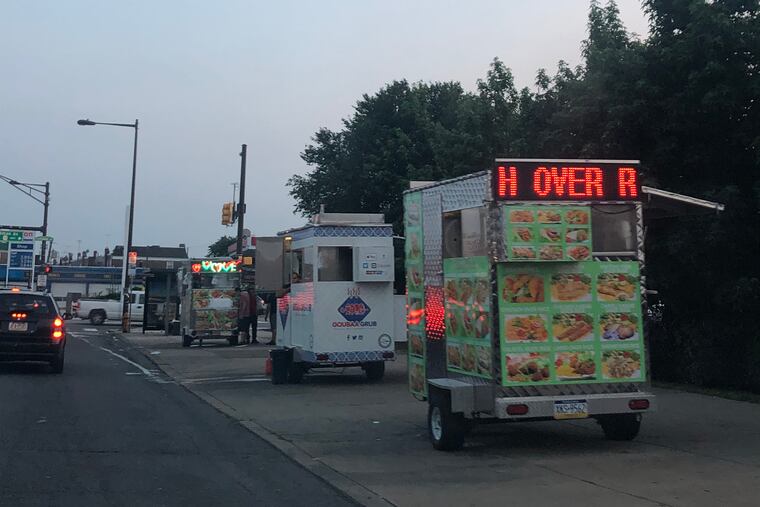City Council’s food truck ban in 10th District hurts diversity and business | Opinion
City Council's law, banning food trucks in the 10th District, disrupts a diverse cultural ecosystem that makes up the Northeast.

Northeast Philadelphia has become home to a cultural melting pot. But some local elected officials are not working in the community’s interests and want to stifle its cultural diversity.
On June 6, Philadelphia City Council passed a food truck ban bill, introduced by 10th District Councilman Brian J. O’Neill. Under the ban, the district’s last allowed food trucks have to close shop by October 1. O’Neill’s Twitter biography describes him as “representing the 10th District and the people of Northeast Philadelphia," yet represent, this latest move does not.
» READ MORE: Longtime Philly GOP Councilman Brian O’Neill faces test against Democrat backed by outside group
The law disrupts a diverse cultural ecosystem that makes up the Northeast. New cultures that take root in the Northeast create a healthy codependency that builds individual and business prosperity.
The bill was introduced because, O’Neill told the Northeast Times, some brick-and-mortar business have complained about street vendors that have parked near their establishments and don’t have to pay rent.
When interviewed, vendors on Cottman and Bustleton Avenues told me they pay for permits to park trucks on streets, pay their taxes, and comply with health department requirements.
Halal trucks are the majority hurt by this bill, affecting the immigrants who run many of them. Mohamad Goubaa owns some of these affected food trucks. During Ramadan, his truck prepared food for local mosques at breakfast. He wants the Northeast to grow as a supportive, ethnic melting pot.
O’Neill already restricted food trucks in parts of his district. Now, he claims they don’t fit what he described as the suburban aesthetic of the whole Northeast.
The Northeast has no “suburban aesthetic.” While it shares some of the aspects of neighboring counties, the Northeast is still part of Philadelphia, making it contrast from its suburban neighbors.
Matt Rossi, owner of the brick-and-mortar Nick’s Roast Beef as well as some food trucks and president of the Philly Mobile Food Association, notes that the Northeast in fact varies in its density and cultural offerings.
“All parts of each district are different. There are some residential, ‘suburban’ parts of the 10th, but there are also some very commercial parts of this district,” said Rossi. “I disagree with [O’Neill]. You can’t choose to be Philadelphia when you want to be.”
O’Neill — whose office did not respond to my phone call, email, or visit to the Councilman’s office seeking more information on the ban — claims to be targeting pesky food trucks. But that in turn affects the people who run the trucks and depend on their employment, including those owned and operated by recent immigrants. Some are not fluent in English and are striving to plant roots and support their families.
A food truck owner who chose to remain anonymous, fearing backlash from speaking out, voiced his frustration.
“We’ve been here for three years,” he said. “You can’t just kick us out. We’re a unique business.”
A food truck employee who works at another truck, Sajid, doesn’t know what he’ll do once his truck closes and cuts off his source of income.
Goubaa and other truck owners learned their businesses would be closed when customers mentioned the bill.
“We tried to contact O’Neill, but he didn’t respond,” he said.
Customers I spoke with are unhappy. Many are coming in from the 6th District, where food trucks are already banned. One customer, Tamika, stopping to grab lunch, shared her disappointment.
“ I don’t think [the law] is fair. I like their food,” she said. “There’s enough business for everyone.”
She supports Halal trucks because of vegan options, fast service, and cheap prices, which nearby restaurants don’t offer.
Rossi, as a restaurant owner, supports the trucks’ right to stay open.
“They affect me as a business, but I believe in entrepreneurship. They’re allowed to be on public sidewalks because they pay for the permit and all fees,” he said. “What I’m worried about is as one district closes food trucks, this may lead to more districts banning them.”
Constituents, whether they’re truck or restaurant owners, employees, customers, or just people who are interested in the bill, are being ignored.
The law hurts families who rely on the income, kills thriving businesses, and prohibits diversification of the Northeast. Its passage raises the question of which community will be attacked next and under what premise?
Mr. O’Neill, it’s time you represent the people of the 10th District — not impede both business and diversity. If diversity and growth truly bother you, the suburbs are a great alternative. Someone once said they have a special “aesthetic.”
Viktor Kagan, a lifelong Northeast Philly resident, is a rising School District of Philadelphia senior who has a passion for local politics and environmental policy.